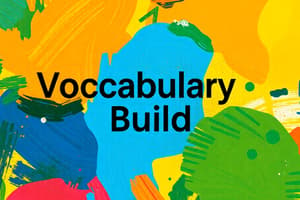Podcast
Questions and Answers
What is one strategy mentioned for teaching contextual vocabulary?
What is one strategy mentioned for teaching contextual vocabulary?
- Using context clues (correct)
- Encouraging rote memorization
- Teaching vocabulary in isolation
- Repeating words multiple times
How can learners make personal connections to new words?
How can learners make personal connections to new words?
- By ignoring unfamiliar words
- By memorizing word lists
- By drawing pictures or discussing with a partner (correct)
- By reciting the words loudly
What type of activities can be used to make vocabulary learning more engaging and enjoyable?
What type of activities can be used to make vocabulary learning more engaging and enjoyable?
- Listening to audio recordings of vocabulary words
- Silent reading and writing essays
- Word puzzles, role-playing exercises, interactive quizzes (correct)
- Copying vocabulary words repeatedly
Which instruction approach combines explicit instruction with in-context components for teaching vocabulary?
Which instruction approach combines explicit instruction with in-context components for teaching vocabulary?
How does contextual usage contribute to vocabulary learning according to the text?
How does contextual usage contribute to vocabulary learning according to the text?
How does contextual usage help in vocabulary learning?
How does contextual usage help in vocabulary learning?
What is one of the aspects of vocabulary acquisition highlighted in the text?
What is one of the aspects of vocabulary acquisition highlighted in the text?
How does contextual vocabulary learning help in making personal connections to new words?
How does contextual vocabulary learning help in making personal connections to new words?
What is the primary role of contextual usage in improving comprehension?
What is the primary role of contextual usage in improving comprehension?
In what way does contextual usage differ from rote memorization?
In what way does contextual usage differ from rote memorization?
Flashcards are hidden until you start studying
Study Notes
Vocabulary: Contextual Usage
Vocabulary is a crucial aspect of language learning and understanding, as it allows us to communicate effectively and convey our ideas. One of the most important aspects of vocabulary acquisition is contextual usage, which refers to learning how words are used in their typical contexts. This approach helps learners make connections between words and their meanings, ensuring a deeper understanding of the language.
How Contextual Usage Helps in Vocabulary Learning
-
Clarity of meaning: Contextual usage provides learners with clues or hints surrounding an unfamiliar word, helping them infer its meaning. This can include words, phrases, or sentences that appear before, after, or close to the word, as well as visuals or headings embedded in the text.
-
Connection between words and meanings: Contextual vocabulary learning demonstrates how vocabulary words are used in different contexts, allowing learners to make personal connections to new words. This can be achieved through activities such as drawing pictures related to new words or discussing words with a partner.
-
Improved comprehension: A strong vocabulary is essential for understanding the meaning of a text, and contextual usage plays a significant role in this process. By learning words in their typical contexts, learners can better comprehend the content of a text and improve their overall reading comprehension.
Strategies for Teaching Contextual Vocabulary
-
Use of context clues: Encourage learners to use clues or hints provided in the text to help guess the meaning of unfamiliar words. This can be done through activities such as word searches, crossword puzzles, or using visual aids to support learning.
-
Personal connections: Encourage learners to make personal connections to new words by drawing pictures or discussing them with a partner. This helps learners to better understand and remember the words they have encountered.
-
Games and activities: Incorporate games and activities into the learning process to make vocabulary learning more engaging and enjoyable. This can include word puzzles, role-playing exercises, or interactive quizzes.
-
Explicit and contextual instruction: Combine explicit instruction components with in-context components to teach learners how words are used and their meanings. This approach can include providing word definitions, teacher talk using target words, and activities where learners are encouraged to use the target words.
In conclusion, contextual usage is a vital aspect of vocabulary learning, as it helps learners understand the meanings of words and their usage in different contexts. By incorporating contextual learning strategies into the classroom, educators can improve learners' comprehension and overall language skills.
Studying That Suits You
Use AI to generate personalized quizzes and flashcards to suit your learning preferences.




